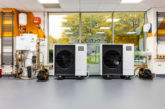
As the nation moves towards its target of reaching net zero by 2050, closing the skills gap is becoming increasingly important. Ian Trott, Head of UK Training Solutions at Baxi, explains the steps being taken to bridge the skills shortage and encourage a more diverse workforce of the future.
According to the latest stats from industry sources, in 2023 around 60,000 heat pumps were installed in the UK. To meet its ambition of 600,000 installations per year by 2028, DESNZ has set a target of 12,000 trained heat pump installers, with 7,000 installers trained so far. However, this falls short of the Heat Pump Association’s forecast that a minimum of 33,700 trained installers will be needed to meet demand. As with the emergence of any gap, there’s an opportunity on the table to fill it.
We can take plenty of encouragement from the fact that as of 31st March 2024, there were over 150,000 Gas Safe registered heating engineers in the UK. By training up these existing professionals and encouraging people from all backgrounds into the profession, the skills shortage hampering progress to net zero can certainly be addressed.
So, what exactly does the training on offer need to look like to develop the skills we need as a sector and as a nation?
Training for all
It is imperative that both manufacturers and the government provide accessible training courses that focus on the wide variety of heating solutions available to accelerate the move to low carbon heating.
This includes courses on electric solutions like air source heat pumps, hot water cylinders and electric boilers. The ask of today’s installers is to understand the entire home heating system and consider measures including insulation to maximise the energy efficiency of boilers or heat pumps. An understanding of complementary technologies, such as cylinders paired with solar photovoltaic panels, will also be necessary to optimise efficiency.
As homeowners seek to reduce their environmental impact and energy bills, they will need skilled, local heating engineers who can advise on various options. Undertaking these types of training courses will enable installers to deliver the right solution for their customers.
High-quality training for new engineers is also vital to ensure installations are completed correctly the first time and perform as expected. As we all know, incorrect installations can lead to inefficient systems, higher energy bills and costly call-outs.
Training providers and manufacturers play a key role in upskilling the current and future workforce as the heating landscape evolves. In addition to offering training courses, providing support such as assisted commissioning and aftercare for homeowners and installers will remain just as important. This can be provided through customer service provisions and networks of service engineers. This will ensure peace of mind for customers from day one and the knowledge that help is available should they need it further down the line.
Leading by example
To provide high-quality training for installers across the UK, Baxi has opened a new 10,000 sq ft Solutions Academy at its Warwick headquarters. The investment in the centre aims to increase annual installer training capacity on the site from 600 delegates in 2023 to 2,000 in 2025.
This enhanced capacity as well as e-learning and pre-learning capabilities, ensures those heating engineers keen to keep up to date on the industry’s latest developments, can do so in a range of different formats. Baxi’s nationwide team of 10 expert trainers is also being expanded to operate out of four wholly owned facilities and 13 satellite centres hosted by third-party education specialists. Up to 10,000 installers a year will be able to visit these sites by 2025, as well as benefit from Baxi’s e-learning platform.
These investments will go a long way in making the provision of training facilities more accessible to all heating engineers.













